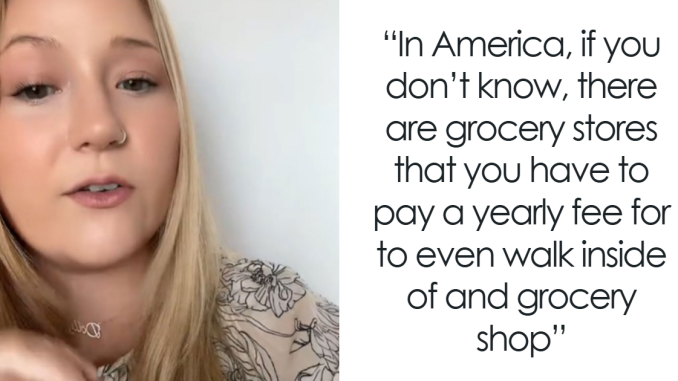
Americans are getting tired of subscriptions. CNET’s second annual subscription survey found that an average American spends $1,080 per year on subscriptions. What’s more, 61% of the respondents are rethinking the amount of their subscriptions and 26% have canceled at least one.
One woman recently called out Walmart for charging shoppers a fee to bag their own groceries. Membership-only Sam’s Club also got some flack for asking members to pay $55 if they want to shop before 10 AM. People started saying how this is straight out of a Black Mirror episode and voicing their fears about the ugly side of capitalism.
More info: TikTok
Shopping fees in the U.S. are becoming absurd, and people are not afraid to call it out
Image credits: Natalia Blauth (not the actual photo)
One woman was infuriated to find that Walmart is now charging an extra fee for using self-service checkouts
Image source: @kirby.in.scandi
Membership-only retailer Sam’s Club also made shopping before 10 AM an “exclusive Plus perk”
Image source: @kirby.in.scandi
The woman’s video garnered over 200k views in three days
@kirby.in.scandi Originals: @Liz Neptune and @verbalnuisance so now Walmart and Sam’s Club in the United States are charging shoppers membership subscription fees in order to use self checkout or shop before a certain time in the morning… #theamericandream #usa #america #livingabroad ♬ original sound – Kirby in Scandi 🇩🇰
The TikToker’s claim is a tad misleading: people can still use the self-checkout at most Walmart stores without a subscription
A subscription fee for using a self-checkout: sounds dystopian, huh? While it may seem that we have to pay subscriptions and memberships for almost everything nowadays, self-checkout is not actually going under a paywall at Walmart.
People on the internet have been ringing these alarm bells since last year. There was a Facebook video floating around with claims that “Walmart is charging $98 to people to use self-checkout.”
Reuters and USA Today fact-checked the claim in March of last year and found that it’s not entirely true. The $98 fee the video refers to is the subscription fee for Walmart+, a membership that gives shoppers perks like free delivery, gas savings, and more. They don’t list using the self-checkout lanes a one of the perks.
A spokesperson for Walmart Kelsey Bohl told Reuters that sometimes self-checkout lanes might get reserved for Walmart+ members depending on how busy the store gets. A store manager might make the decision to limit access to the self-checkout lanes to Walmart+ members only and Spark delivery drivers
“During these times of limited access, some stores are designating select self-checkout stations for Walmart+ customers using our Scan and Go service,” Bohl explained.
Another Walmart spokesperson Joe Pennington told Business Insider that this policy is similar to express lanes for shoppers with 10 items or less. He also claimed that this is not a strategy to encourage more people to sign up for Walmart+.
Retailers are experimenting with self-checkout policies due to dropping sales and increasing theft
Why is access to the self-checkout lanes getting limited and access to regular checkout lanes is not? This might have to do with how common theft at self-checkout has gotten.
Statistics show that around 20.1 million Americans have stolen from a self-checkout kiosk. 8.85 million plan to do it again, and only 33% of the 20 million have been caught.
The problem often lies in there not being enough staff to oversee the self-checkout machines. Recently, the city of Long Beach in California has even implemented a law that would charge the store a $2,5000 fine if one worker oversees more than two machines at a time. It also requires stores to keep at least one staffed register at all times.
There’s also the phenomenon industry insiders call the “partial shrink”, or more and more missing inventory. When at a self-checkout kiosk, people might not scan all their items properly. That still counts as theft, even if accidental. In fact, around 21% of self-checkout thefts are accidental.
A study by a checkout-free tech startup Grabango revealed that it’s 21 times easier to get stolen groceries past a machine than a human. They also found that the losses of self-checkout theft account for 3.5% in revenue sales. For some stores, that’s half of their bottom-line profit.
To combat all of this, Walmart, Target, and other retailers in America are experimenting with their self-checkout policies. If other cities in America follow Long Beach and implement similar laws, we might be seeing a return to staff-operated checkouts.
